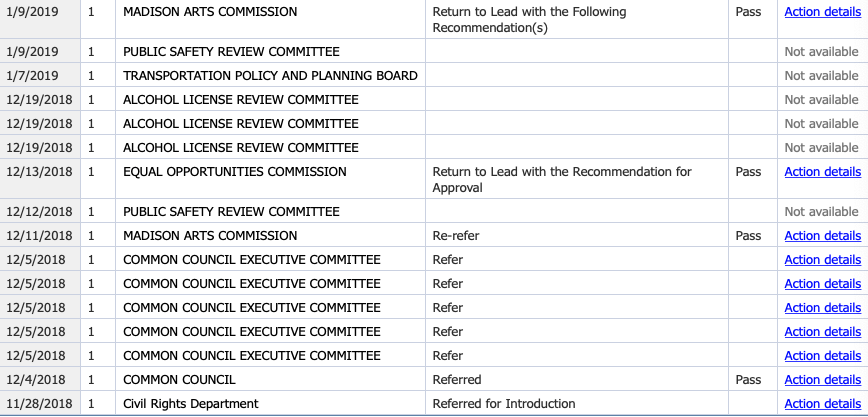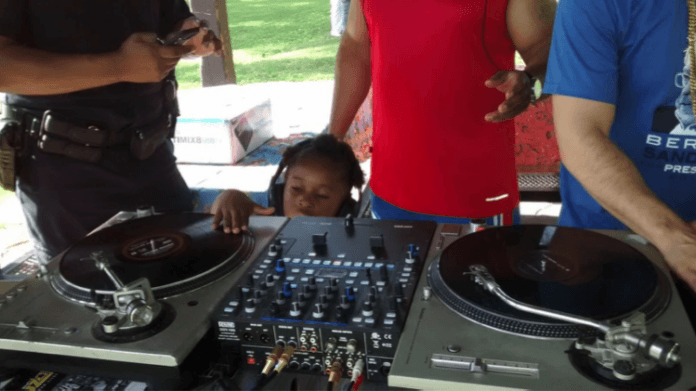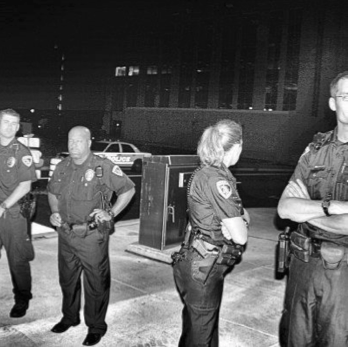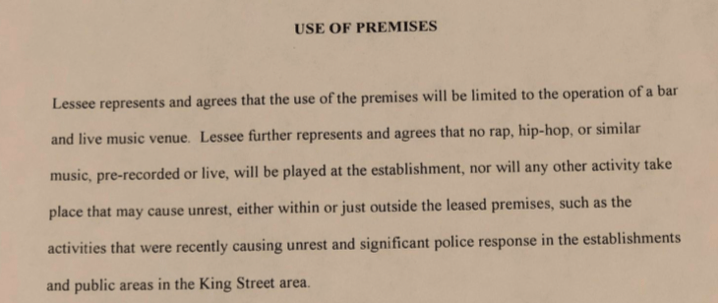The Common Council Executive Committee is considering the Task Force on Equity in Music and Entertainment report today, the last stop before it goes to the council. This has already gone to the Equal Opportunities Commission (EOC), Alcohol License Review Committee (ALRC), Transportation Policy and Planning Board (TPPB), Public Safety Review Committee (PSRC) and the Madison Arts Commission (MAC). In the past month and a half they all have recommended to either accept or adopt the report. Accept means they receive it and don’t commit to actually doing it, adopt means it becomes policy. The title says accept, the resolution says adopt so I think there might be some confusion. Anyways, here’s their 31 Recommendations!
ADOPTED OR ACCEPTED
Because the alders are concerned about whether this report gets adopted (becomes position of the city and is supposed to be carried out) or accepted (thank you very much, place on a shelf) I think its important to understand what the committees voted on:
The CCEC agenda says this:
- Equal Opportunities Commission Recommended Approval (12/13/18)
- Alcohol License Review Committee Recommended Approval (12/19/18)
- Transportation Policy & Planning Board Recommended Approval (1/7/19)
- Public Safety Review Committee Recommended Approval (1/9/19)
- Madison Arts Commission Recommended Approval (1/9/19)
I believe ALRC and PSRC only recommended “acceptance” of the report. I can’t tell from Legistar – PSRC (I was there and have video of “acceptance” – see below) and ALRC (I heard voted to accept, video below confirms) don’t have their committee actions in there yet. I don’t know what TPPB did (see video below). 
Also, please note, even when reports get fully approved, it doesn’t mean they will be carried out unless someone (alder, staff, community pressured) is championing the report.
WHY WAS THIS REPORT NEEDED?
Here’s some of the events outlined in the report that led to creating the task force:
2009
- Incident at Brink Lounge results in “indefinitely postponing” booking of Hip-Hop. No Hip- Hop acts have been booked at the Brink Lounge since then. This incident resulted in media coverage of Hip-Hop community members speaking out about inequity.
- Dexter Patterson and ShaH Evans develop a list of best practices with the Alcohol License Review Committee (ALRC) for Hip-Hop shows aiming to increase awareness and inclusion. These best practices were discussed by the ALRC but never distributed to venue owners or otherwise implemented.
2010
- The Madison Hip-Hop community comes together to strategize as to how to improve the community’s image. This community team worked to produce the first Madison Hip-Hop Awards show. Urban Community Arts Network (UCAN) was formed as a result and incorporated as a non-profit in 2011.
- UCAN begins meeting with MPD (Chief Noble Wray, Captains, and others) and the Mayor’s office (Deputy Mayor of Public Safety) regarding over-policing and inequitable treatment and booking of Hip-Hop shows.
2012
- Karin Wolf, Madison Arts Program Administrator, calls a meeting with Hip-Hop representatives while composing the City of Madison Cultural Plan. The discussion was focused on the perception of public safety issues related to Hip-Hop rather than art and culture.
- UCAN begins meeting with an unofficial task force including the Deputy Mayor of Public Safety, MPD, ALRC, and Madison Arts Commission (MAC).
- Madison Arts Commission forms a Hip-Hop Ad Hoc Subcommittee
2013
- MAC Hip-Hop Ad Hoc Subcommittee administers survey regarding perceptions and practices for Hip-Hop performances.
- Civil Rights joins unofficial task force meetings.
- Unofficial task force decides that official task force would be the best path forward.
2014
- Ad hoc Hip-Hop Subcommittee survey report is released and MAC recommends starting an official task force to address these issues.
- The best practices document is distributed to MAC, ALRC, and community members for revisions and updating.
2015-2016
- Formation of task force is delayed while decisions are made about appropriate staffing as well as due to transitions in staffing in the Mayor’s office, MPD, and ALRC.
2017
- A resolution to create the Equity in Entertainment Task Force is introduced to council in February and passes in June. Task Force member recommendations are confirmed in August and September.
Additionally, they note in the report (I chose a few excerpts that I think are important for context):
- Madison calendars are packed with discussions and celebrations of the arts. When Madison was preparing its Cultural Plan, adopted by the Common Council in 2013, the City Arts Administrator, Karin Wolf, convened Madisonians across multiple sectors to discuss what should be included in the Plan. These groups discussed arts and culture related to various artistic genres; however, a conversation centered around Hip- Hop music and culture focused on public safety rather than the art itselfin spite of Ms. Wolf’s attempts to keep the focus on art and culture.
- Local Hip-Hop has experienced tumultuous ups and downs over the past three decades. The general pattern follows a two- to four-year cycle. The cycle begins with a rise in local Hip-Hop shows around the city. As Hip-Hop artists and fans gather, community builds, and collaborations and synergy between artists develops. As often happens at bars and clubs for a variety of reasons, eventually a fight or other disturbance will occur and is featured prominently in the news. Venues begin to refuse to book Hip-Hop shows, and the scene comes to a halt. This phase generally lasts for six months to a year before another venue will book a local Hip-Hop show and the cycle continues.
- The perception has been that local Hip-Hop draws crowds of violent people who have little disregard for property or patrons. A 2017 study conducted by UW-Madison debunked this myth demonstrating that levels of violence are essentially the same across all genres of music from folk to karaoke to Hip-Hop to metal.
- Venues such as R Place on Park17 & Adair’s Lounge were short lived when media, police and community pressurecontributed to their closing.
Police presence and response have been excessive in many documented instances. Officers in riot gear, flashing car lights, paddy wagon presence – to a show ending peacefully at The Frequency.
- Security – Because City stakeholders have stated that there is a concern about ensuring proper security is present at Hip-Hop events, we suggest that the City provide some assistance by subsidizing funding for security at Hip-Hop events. We provide two such examples from elsewhere in the country. (New York -this is the link provided but it doesn’t work for me – https://www.nytimes.com/2016/05/31/arts/music/rap- concert-shooting-renews-a-raciallycharged-debate-on- safety.html, Asheville)
-
Structured Events – Similar cities have had success in sponsoring a range of events and festivals, from Open Mic Nights to cross-genre events.
Athens, GA
Monthly Hip-Hop Showcase with mix of different subgenres of Hip-Hop
redandblack.com January 24, 2018Baltimore, MD
Monthly Be Civil Battle featuring battles in rap, DJing and dancing
April 26, 2017Cleveland, OH
Workshops/website/venue
Denver, CO
Test Kitchen (American idol type event for Hip-Hop) denverite.com February 20, 2017
Kansas City
Flyover Festival kansascity.com July 20, 2017
Omaha, NE
Cross-genre collaboration (symphony and artist Wyclef)
Nashville, TN
Hip-Hop Nutcrackerlebanondemocrat.com July 30, 2017
Portland, OR
Young, Gifted and Brown Dance Party
Arts in Education – We suggest that the City support implementation of arts education programming featuring artists of color.
|
Minneapolis, MN |
After school programming (Hope Community/Vega Productions) |
thrillist.com August 30, 2016 |
|
Oakland, CA |
Artists in Schools |
AlphabetRockers.com |
|
Seattle, WA |
Seattle Growth Podcast |
REPORT RECOMMENDATIONS
Equity of Access (see also 13 – 16)
1. Within one year, the City of Madison should create a full-time staff position in the Mayor’s office at $60,000 per year (including pay and benefits) focused exclusively on promoting equity in arts and entertainment. This staffer would be responsible for ensuring that relevant ordinances are effectively communicated to the general public and be the point person for navigating licenses for entertainment events (from block parties to music festivals). In addition to being directly available to the public, one of their mandates would be, in coordination with relevant departments, to produce “how-to” videos, tool-kits, and literature that would be available online and at Madison Public Library branches. As a representative of the City, this staffer would also advocate for the inclusion of underrepresented populations and art forms at publicly accessible events like Make Music Madison and Dane Dances.
Culture and Community
2. Within one year, the City of Madison should work with festival organizers who are receiving City funds to ensure that artists of color, and specifically Hip-Hop artists, are incorporated into their programming.
ARTS COMMISSION RECOMMENDATION: Within one year, the City of Madison should work with festival organizers who are receiving City funds to ensure that artists of color are incorporated into their programming and to specifically incentivize the inclusion of Hip-Hop artists.
3. Within five years, Hip-Hop should be incorporated into all kinds of events, including those at licensed entertainment venues and publicly accessible events such as Taste of Madison and Art Fair on the Square.
4. Within five to ten years, the City of Madison should work to support a music festival featuring Hip-Hop music, dance, and visual arts, R&B, etc.
5. Within one year, the Common Council and Mayor should commission a study on the level of equity in policing Hip-Hop related events in comparison to other genres.
ARTS COMMISSION RECOMMENDATION: Within one year MPD should track and report data related to the level of policing of all music events in a way that it is possible to compare incidents by genre. This report should be submitted to the Mayor and the Common Council annually.
6. Within one year, the City should work to increase the number of residents trained as EOC Certified Partners to witness music and entertainment events to ensure that equity is maintained. The City should offer these trainings at a minimum of once per year and intentionally advertise these trainings in neighborhood libraries, businesses, and centers as well as with Neighborhood Resource Teams.
MAC RECOMMENDATION: Within one year, the City should work to increase the number of residents trained as EOC Certified Partners to witness music and entertainment events to ensure that equity is maintained. The City should offer these trainings at a minimum of once per year and intentionally advertise these trainings in neighborhood libraries, businesses, and community centers, Neighborhood Resource Teams and other appropriate agencies.
7. Within two years, the City should hire a consultant to develop a plan to build music infrastructure to support independent artists. Venues should work closely with the newly created Entertainment Equity City staff position by no later than 2020 (refer to recommendation 1).
ARTS COMMISSION RECOMMENDATION:
7a Within two years, the City should hire a consultant to develop a plan to build music infrastructure to support independent artists.
7b Venues need to work closely with the newly created Equity City staff position by no later than 2020 (refer to recommendation 1).
Venues
8. Within one year, the Department of Civil Rights should develop procedures to train all venue staff in anti-bias practices and bi-cultural and cross-cultural interactions. The ALRC should recommend that all staff be trained within two years.
a. This should be a requirement associated with receiving an entertainment license or a bartending license in addition to Tavern Safety. Venue owners, bartenders, and other venue staff should complete eight hours of training annually. New staff should attend training assoon as possible after hire.
b. This training should be provided by the City of Madison Racial Equity and Social Justice Initiative Staff, Department of Civil Rights, or by an appropriate Community Partner contracted to provide the training by the City of Madison. This training should be provided at no cost to venue owners aside from costs associated with staff salaries, building utilities,etc.
c. Venues should implement clear anti-bias procedures and specific discipline policies for violation of these procedures. Guidance should be provided by the City of Madison Racial Equity and Social Justice Initiative staff. These policies should be developed within one year and implemented within two years.
9. Within one year, venues should begin to follow the 2015 Revised Entertainment Practices for Venue Owners (Appendix C).
10. Within two years, the ALRC should require that all venues with an entertainment license with more than 14 employees submit an Affirmative Action Plan similar to entities contracting or receiving grant money from the City of Madison. The ALRC shouldemphasize EEOC (Equal Employment Opportunities Commission) language and discrimination definitions when granting these licenses.
11. Within five to ten years, the City should support finding venue spaces outside of the downtown area (e.g. Oscar Mayer, Westgate Mall), hopefully in conjunction with a new and improved city transportation plan.
ARTS COMMISSION RECOMMENDATION: Within five to ten years, the City should support finding venue spaces outside the downtown area (e.g. Oscar Meyer, West Gate Mall), efforts should be coordinated with a new and improved city transportation plan.
12. Within five years, the City should invest in alternative venues dedicated to Hip-Hop. This can be in the form of an Arts Incubator, or alternate satellite venues incorporating community center activities during the day and operating as a licensed venue by night.
ARTS COMMISSION RECOMMENDATION: Within five years, the City should support the creation more alternative venues dedicated to Hip-Hop. This can be in the form of an Arts Incubator, or alternate satellite venues incorporating community center activities during the day and operating as a licensed venue by night. The City should seek ways to incentivize inclusion of music venues and black box theatres in the development process through TIF credits or HUD funding or other creative forms of cultivating the development business development.
Equity of Access (see also #1)
13. Within one year, the City should consider providing grants or sliding-scale fees for arts events that require permits. Bringing a community together around music should be achievable for all citizens at all income levels. Along with this, language should be standardized for all permitted events, and it should be clear which type of event needs which type of permit.
14. Within five to ten years, the City should commit to making improvements in the Madison Metro transportation system recommended by the Transit Development Plan (2013).
15. Within five years, the City should work with the Madison Metropolitan School District to fully fund arts education, leveraging resources such as grant funding. The City should advocate for MMSD expanding efforts to include non-traditional music and arts programming during the school day. Community organizations that work with young people should also be directly supported by the City to make culturally relevant arts opportunities available outside of school hours.
16. Within five years, the City should invest in “arts incubators”: venues that provide education and resources for artists located throughout the city.
Media Coverage
17. Both print and television media outlets should commit to more balanced culturally sensitive reporting and should develop systems to track their own performance/goals in this area. The City of Madison public relations staff should take a proactive approach to promoting underrepresented events and events by and for citizens of color.
18. Both print and television media outlets and City of Madison public relations staff should utilize style/language resources and culturally competent best practices.
19. Both print and television media outlets and City of Madison public relations staff should hire more people of color who can contribute different cultural realities and perspectives to stories and coverage.
20. Both print and television media outlets should educate staff on the historical contexts of the linguistic and culturally insensitive communication styles and ideas that no longer serve, honoring Madison’s diversity and mutual respect. The City of Madison Racial Equity and Social Justice Initiative staff should provide this education to City of Madison public relations staff.
21. We highly recommend the 2015 Race Forward style sheet on reporting racially sensitive topics. City public relations staff can support equity of representation by taking steps to promote events and initiatives by underrepresented arts genres and/or led by people of color as they would for large scale or annual events.
Police Recommendations
22. The City of Madison Police Department (MPD) should commit to more balanced and culturally sensitive policing. The Deputy Mayor of Public Safety should work with the Division of Civil Rights and MPD to set performance goals in this area and develop methods to track performance. We recommend that funding increases be directly tied to these performance measures.
23. MPD officers and public relations staff should be trained in culturally competent practices for writing, assessing, and categorizing incident reports. We highly recommend the 2015 Race Forward style sheet as a guide for these reports and other MPD communications.
24. MPD should make available to the public specific policies for determining police presence and deployment for all events including in nightclubs, at concerts, and at festivals. If such policies do not exist, MPD should develop these policies with public input within one year.
25. MPD should increase employment of people of color to support the different cultural realities and perspectives they contribute to law enforcement work.
26. MPD should provide training to staff on the historical contexts of culturally insensitive understandings and ideas that no longer honor and respect our community diversity.
27. MPD should reduce police presence in communities of color, and when police are presentin these communities, the focus should be on building build trust and connection.
Media and Law Enforcement
28. We recommend that all media and law enforcement staff view the film “13th“ through which filmmaker Ava DuVernay explores the history of racial inequality in the United States. The film focuses on the fact that the nation’s prisons are disproportionately filled with African Americans. It also explains many of the origins of racist language/understandings used to talk directly and indirectly about black people in the Media, which lead to conscious and subconscious behavior and attitudes by law enforcement.
Transportation
29. Madison Metro should expand late night bus services throughout the city. By not running even main-route buses past bar time, the City makes it much more difficult for residents to get home safely after a night out. The City of Madison should not assume that private industry (taxi and ride-sharing apps) is as effective as safe, reliable, and affordable public transportation.
30. The City should more frequently provide reduced-fare and free service on fixed routes during major music and entertainment events. This would address both public safety and equity of access to these events.
31. Through a competitive bidding process, the City should contract with a local party bus or van company to provide late night transportation for residents in neighborhoods without access to public transportation or far from transfer points. This service could be provided on a sliding scale to City of Madison residents.
2015 REVISED ENTERTAINMENT PRACTICES FOR VENUE OWNERS
This was also included as Appendix C.
- Promoter research. If you are working with a promoter, get to know the promoter. Ask for references from previous shows. Check the references and ask if the venue encountered any issues with the event. Ask the promoter if they have general liability insurance to protect you, your venue, and your patrons. If you are not familiar with booking acts, then consult other establishments that have experience successfully hosting a wide variety of events and/or those familiar with the entertainment scene.
- Research the acts. All headline acts should have a press kit which includes music samples, photos, previous show listings, and a bio. Again, talk to venues that have hosted the act to check for any previous concerns.
- Offer a diverse music set. Offer different types of shows and aim for diverse demographic. Also, aim for diversity within the same bill for the evening. If you do the same genre over and over again, you may attract the same crowd which may result in future issues.
- Market to a wide audience. The more diverse the crowd, the less likely you are to haveproblems. If you are distributing flyers, don’t focus exclusively on certain areas orcertain populations. Ask the promoter how they are advertising, how many people they are targeting, and what media they are using for the ads. Review the promotional material and engage the promoter in a conversation if you have any concerns.
- Create your own set of rules. Your “house rules” will help set perimeters for the promoters and acts. For example, decide if there will be a dress code, and if so, make sure it isenforced consistently across ALL populations. Avoid policies that target specific populations, such as, discounts for students or ladies’ nights. If applicable, consider placing your rules into a contract.
- Keep a log. Document the activities that take place in your establishment. Especially take note of anything out of the ordinary and steps that your staff took to alleviate problems and in addressing problem patrons.
- Anticipate your crowd. Based on your research of the acts and advertising, you should have a good idea of your crowd size. If you anticipate large crowds, staff accordingly andconsider implementing policies that may prevent problems. Remember, issues can arise at any performance for all genres of music!
- Security. Hire your own licensed and bonded security personnel. If working with a promoter, you may ask the promoter to contribute to the security costs. Do not rely solely on the promoter to provide security. Work closely with the promoter on a security plan. We recommend a ratio of at least 75 to1; capacity to security.
- Lights On. In the event of an emergency situation, immediately turn on all of the lights in your venue. This will not only help disperse the crowd and assist with addressing the situation, it will help police identify any persons if necessary.
- Alert police if you are anticipating larger than usual crowds and encourage them to do a quick walk through.
VIDEO
This is the Public Safety Review Committee Video.
This is the meeting where the ALRC discussed this report, and “accepted” it. The discussion starts about 55 minutes in.
This is the TPPB meeting where they discussed this report. Discussion starts about 28 minutes in. They also “accepted” the report. The discussion is less than 10 minutes.








